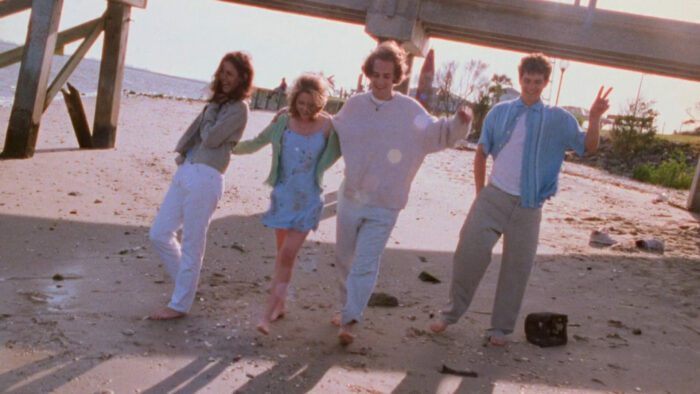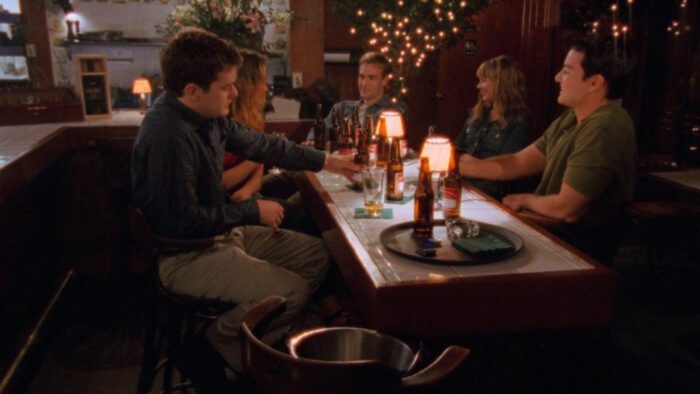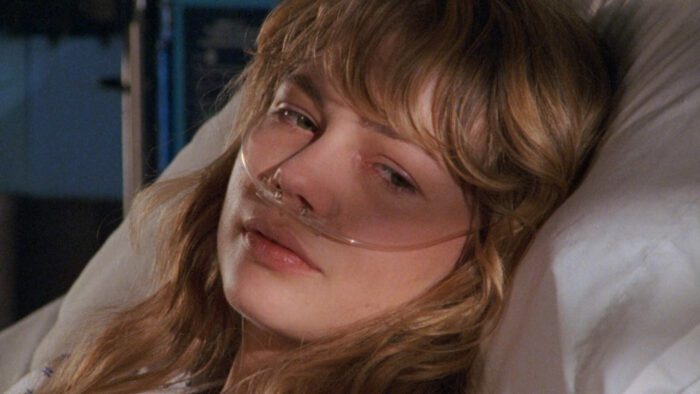25 years ago this past January, Dawson’s Creek premiered on the WB. 20 years ago this past May, its series finale aired. In both instances, the show earned decent ratings and critical acclaim. I loved the show when I watched it as a teen, and rewatching a lot of it earlier this year for the two anniversaries mentioned above, it was clear that I still do. I entered the rewatch asking myself, “Does Dawson’s Creek hold up?” I believe it does because for better and for worse, the show is not only a teen drama, but it consistently comments on itself and the genre, elevating it.
Right away, with the opening scene in the “Pilot,” I was reminded of what I loved about the show. I am one of those viewers who liked the way the characters spoke, particularly in Season 1. As a viewer, I make the choice to buy into whatever world the writers have created. This isn’t the real world to me, but I like it. This is because the opening is literally a short conversation about E.T. and Steven Spielberg.
Then, the conversation between Dawson (James Van Der Beek) and Joey (Katie Holmes) shifts into more teen drama territory, but the characters try to observe things from an objective perspective. After all, these two have seen enough movies to know what the media has to say about a boy and girl being friends. Joey is on the side of something like When Harry Met Sally…in that she believes sex eventually gets in the way. Dawson, however, believes they transcend such thinking.
Being able to comment on the very thing the scene is about is a solid way to begin the series because it establishes much of the tone of the show from here on out. Dawson’s Creek knows what it is, a teen drama, but it also wants its characters to comment on it.

After the iconic opening credits come to a close, followed by shots of the town of Capeside, we find Dawson, Joey, and now Pacey (Joshua Jackson) shooting a micro-budget creature feature. I love that this show’s main character is into movies so much that he makes them with his friends. Not only that, but he’s aiming to submit this movie to a local film festival.
Movies are all over this first episode. In addition to the above, there’s Dawson’s room, which is filled with movie posters and paraphernalia, and the video store he and Pacey work at. Though Dawson’s Creek would grow beyond Dawson at the center of things, movies get referenced pretty consistently throughout the show’s run. Like the dialogue, this is another thing I love about the show.
As for the characters, although I don’t think Jen Lindley was particularly well written in Season 1, I think Michelle Williams did a pretty excellent job in elevating the character. She has baggage, and she certainly doesn’t know how to handle any feelings she might have towards Dawson, but I like that she isn’t apologetic about her past. She can say the wrong thing at times, as well as hurt people, but she’s not a bad person. Her character ends up being the one I like the most throughout the series, and when things come to an end in the series finale, it’s fitting what happens with her. But let’s get back to Season 1.
Dawson falls hard for Jen, much to Joey’s chagrin. Not only does she secretly love her best friend, but she also chooses to not like Jen simply because Dawson does. Meanwhile, Pacey, in the back half of the season, realizes he kind of likes Joey, and even after they bond over a science project, she rebuffs his advances. It’s not because she doesn’t like him back, though. She just loves Dawson, so Pacey steps aside. This sets up the love triangle that’ll end up being one of the focal points of the series as time goes on.
It’s a shame that love triangles sell so well. I’m most definitely in the camp of disliking them. It’s lazy writing, and it’s unfair to the characters. One must choose. Another gets hurt. They all go back and forth ad nauseam. Thankfully, that’s not the first season.
That said, Season 1 has something I’ve never been a fan of, and that is Pacey’s relationship with his English teacher, Ms. Jacobs. Although there’s a sweetness to the relationship, it’s messed up. Honestly, when I was young, I did accept them together. If they wanted to be with one another, who was I to be against it? Now, I’m much older, and watching this storyline play out 25 years later, it’s not cool. Jacobs is clearly taking advantage of Pacey, and at times, he pressures her into continuing their relationship. I’m not a fan, and when it ends a few episodes into the series, I’m happy it’s put to bed.
There’s also the way the show treated Bodie. The only Black character in the first season, he pops up here and there as the show progresses, but he doesn’t get to do much. Although he’s given a good line about racism in Season 3 Episode 16, the show didn’t know what to do with him. And aside from some characters of color in later seasons, the show is pretty white. That’s not necessarily a bad thing, but it’s not a good thing, either.
Overall, the first season is solid, and honestly, if this were a one-season series, it could’ve worked. The next five seasons don’t live up to Season 1, in my opinion. There’s less playful commenting on the show itself and more teen drama. This is, in part, due to the love triangle at the center of the series. However, there are definitely things worth mentioning.

Dawson’s Creek is an important show in mainstream television history, specifically due to two elements during the majority of its run. The first involves the character of Jack McPhee, played with unexpected nuance by Kerr Smith, who entered the show at the start of Season 2 as part of the show’s second romantic triangle involving Dawson and Joey.
By the second season’s mid-point, Jack’s relationship with Joey came to an end. He was gay, and although not the focal point of the season, we get to follow him as he not only struggles to accept who he is but also everyone else’s reaction to this. What I find so interesting is that Jack was written into the show along with his sister Andy (Meredith Monroe). She ended up being a love interest for Pacey before his relationship with Joey went to the next level.
Andy was smart and had her issues with mental illness throughout the series, but once high school ended, she was off the show. Jack stayed. Not only that, but he also became integral to the show’s core group, becoming best friends with Jen and close to Pacey. His sexuality, like the other characters, wasn’t brushed to the side, either. This wasn’t an instance where a character comes out as gay and then it’s never spoken of again. Jack had relationships and even shared kisses, including one that was considered the first kiss of its kind on broadcast TV at the time. I like Jack.
The other thing I want to mention about these seasons is that every once and a while, the show played with its format. I’m thinking of six episodes: “The Longest Day,” “Four Stories,” “Four Scary Stories,” “Downtown Crossing,” “Day Out of Days,” and “Castaways.”
Whether it’s shifting points of view, using vignettes, or staying with just one or two characters throughout the episode, I always like when shows do something different. And given the show’s popularity and image at the time, I like that the writers took chances and didn’t simply dole out the same formula week after week. The show may not comment on itself as much during these seasons, but it refuses to simply be a teen drama, and I love that as well.
Now, over the course of the series, Dawson re-tells the events of the first season and a half or so three times. The first is in the second season, made with money won from the movie he shot in the first season. The second is made in the final episodes of the sixth season. Finally, in the series finale, he is the showrunner of a Dawson’s Creek-like show. He spends much of the two-part episode figuring out the ending to the first season of his show. Will he change things? Keep them the same?
On May 14, 2003, “All Good Things…Must Come to An End” premiered. It featured the return of series-creator Kevin Williamson (of Scream fame, amongst his other work). It’s a two-episode coda for the entire show, given that the previous episode “Joey Potter and Capeside Redemption” served more as the season finale to Season 6.
It’s pretty excellent, and honestly, it’s one of the best series finales I’ve ever seen. Not only does every major character gets a series wrap, but a complete story is also told.
So, Dawson has his show. Joey, meanwhile, is conflicted about her feelings toward the one person she’s always loved. Jack is figuring out how to deal with the fact that he’s dating a man who isn’t out like he is. Pacey is, once again, involved with an older woman. This is all setup, and although none of these threads get lost, they’re not really the important part of the story.
Jen is dying, and it’s a solid choice to not only kill off her character but also to allow the other characters to respond to her death by making big decisions regarding their own lives. Jen’s death is not just plot for the sake of plot (or for the sake of manipulating the audience to tears). It serves a role here, and it’s wonderful to see things come full circle.
Jen entered the series and shook things up between Dawson, Joey, and Pacey. She exits the series doing the same, this time with Jack there as well. And, damn, Williams is so good here. As I’ve said, Jen is my favorite character overall, and this series finale is a big reason why. She shines here, and maybe to the detriment of everyone else’s work in these episodes, she manages to make Jen so human that at times I forget I’m watching Dawson’s Creek.
This series finale elevates just about everyone’s story. The love triangle between Dawson, Joey, and Pacey reaches its conclusion, but the great thing is that Jen’s story shrinks theirs in the best way. Even the characters themselves realize their love triangle has been nonsense. Heck, we never even see the moment where Joey chooses.
We get the payoff, though. Just like we get closure from knowing Dawson is having a meeting with Spielberg or that Jack has found love and a family. Though not entirely absent, there’s not a lot of melodrama in these episodes. When Jen does die, it’s quiet, beautiful, and heartbreaking. I still tear up. That moment is perfect.

It’s not overstating it to say that Williamson’s return was important in closing out the series. Seeing the show return to its equal ratio of being both a teen drama (even those these characters are adults by the series finale) and commenting on being a teen drama allows for a thematic bookend to the series. Dawson’s show and his dilemma in crafting an ending allow for the show to reflect on how it should end. Another thing I love about the show.
Ultimately, Dawson’s Creek remains special to me. Perhaps that has to do with how the show simultaneously embraced its teen-drama roots while also commenting on them. The show is very self-aware. Sometimes, it can get old (see Dawson remaking the first season over and over), but there are also times when the show allows itself to be earnest.
That can result in cheesiness (like that infamous shot of Dawson crying), but it can also give us that scene between Joey and her father, separated by a chain-link fence at the end of Season 1. Or Dawson’s grief over his father’s passing. That moment between Jack and Doug on the beach in the series finale is sweet. This is the stuff I love about the show.
Does Dawson’s Creek hold up? It absolutely holds up to me. This is a teen drama that ran from 1998 to 2003, and it’s about teenagers becoming adults, struggling to find themselves, and movies. It’s exactly the show it wants to be, for better and for worse. Dawson’s Creek is more than what it appears on the surface because it simultaneously embraces and comments on its genre, elevating it, in this writer’s eyes, from teen drama to classic.

